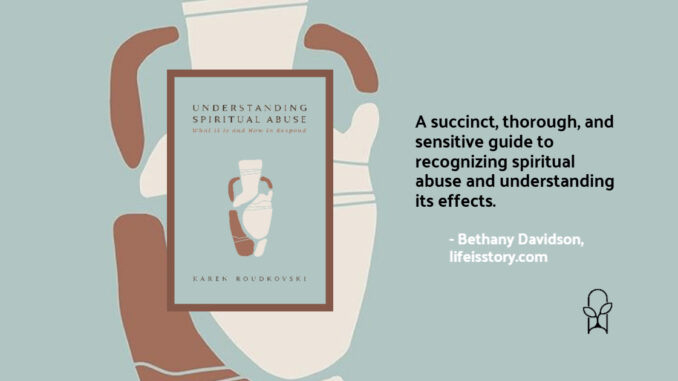
Published by B&H Publishing, B&H Academic on August 1, 2024
Genres: Academic, Non-Fiction, Christian Life, Leadership
Buy on Amazon
Goodreads

Spiritual abuse is a widespread—and often misunderstood—issue. Church leaders may not understand how spiritual abuse manifests and spreads; meanwhile, the impact of spiritual abuse can be devastating to victims, damaging their relationships with themselves, the church, and God.
In Understanding Spiritual Abuse: What It Is and How to Respond, professor and licensed counselor Karen Roudkovski offers wisdom, clarity, and hope for those seeking to understand the nature of spiritual abuse and how to heal. Based on her extensive research and clinical experience, Roudkovski explains:
What spiritual abuse is, how the term arose, and what makes it distinct.
Methods for assessing whether spiritual abuse has occurred, including instructions for the Spiritual Abuse Assessment.
The tactics of spiritual abusers, including control, grooming, deception, and lack of accountability.
The trauma of spiritual abuse, encompassing spiritual, emotional, physical, and relational harm.
Suggestions for spiritual abuse recovery for therapists, survivors, and helpers.
Recommendations for how churches can establish spiritually safe communities.Roudkovski's Understanding Spiritual Abuse is an essential resource for survivors, church leaders, and mental health professionals. Roudkovski provides a counseling overview of the topic while practically guiding leaders to create safe and supportive environments for victims to recover and rebuild from spiritual abuse and its devastating impact.
In recent years, more people have recognized the reality of spiritual abuse, but confusion remains about what it can look like in different settings, and what kinds of behaviors and patterns qualify for this label. Throughout this book, licensed counselor Karen Roudkovski explores the existing literature about spiritual abuse, clears up common myths, and explores nuances of the topic. She then presents the assessment that she developed for identifying spiritual abuse. After this, she explains how spiritual abusers weave their webs of power and control, and she references Scriptures where Jesus corrects these behaviors. She also emphasizes that spiritual abuse can happen to anyone, that any type of person can be a spiritual abuser, and that spiritual abuse can overlap with other forms of abuse.
Understanding Spiritual Abuse focuses on high-level concepts, so it doesn’t include as many example stories as I would have preferred. However, Roudkovski reminds her readers that abusers and victims may be male or female, and that abuse can happen in many contexts and types of relationships. Although she describes standard situations where pastors abuse congregants and abuse other leaders who have less power than they do, she also describes ways that spiritual abuse can occur within the home and in mentoring relationships, and she explains that pastors and other leaders can also be victims of spiritual abuse. She notes that abuse doesn’t just happen through top-down hierarchies, and that powerful, influential committees and individuals can abuse church leaders through similar intimidation and control tactics.
After she explains what spiritual abuse is and how these abusers typically operate, Roudkovski explores the implications for victims, describing how spiritual abuse harms them and what factors they should consider when choosing whether to stay in or leave a toxic environment. She also shares guidelines for how ministry leaders, therapists, and other support people can help survivors heal and avoid traumatizing them further. Then she shares some basic ideas for preventing abuse in spiritual communities. Roudkovski speaks directly to different audiences at different times, and the book is a very comprehensive overview of spiritual abuse and its implications.
Because Roudkovski focuses on the big picture, the book applies to all spiritual abuse cases, regardless whether or not people see themselves in the occasional examples given. In addition to this, even though this book focuses on spiritual abuse that happens within Christian contexts, the the spiritual abuse assessment questionnaire that Roudkovski created applies to anyone, regardless of their beliefs, practices, or community context. Also, even though this is an academic book, it is very readable. The writing is clear and concise, and the subject headings make it even easier to follow the author’s train of thought. This book is very accessible, and the author makes a point of explaining concepts and terminology that may be unfamiliar to her readers.
Overall, I was very impressed with this book. Aside from my desire for more illustrative examples and case studies, my only critique is that the book doesn’t include a bibliography or a recommended reading list, even though the author cites lots of great material throughout the book. I plan to look through the footnotes later to find the titles I want to read, but I wish that the author had included reading recommendations in the resource list in the back.
Understanding Spiritual Abuse: What It Is and How to Respond is an excellent book. It summarizes existing research, presents a carefully designed spiritual abuse assessment that will apply across different experiences, and explores core themes of what spiritual abuse looks like, while also sharing guidelines for how victims and their support people can respond and seek healing. I highly recommend this book to people who are recovering from spiritual abuse, and to therapists and ministry leaders who want to better understand this issue and support people under their care.
